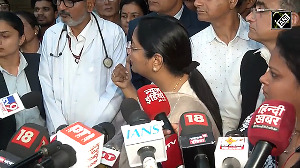In a cavernous, unheated gymnasium in Beijing, Tian Yunzhong hoists himself into position on a set of parallel bars in preparation for his most challenging routine.
"Straight knees, straight knees!" Tian's coach calls out as the lithe athlete swings his legs up in a fluid motion, then pauses in a handstand with arms and legs fully extended.
"Point the toes! Tighten your stomach!" he shouts as Tian, biceps and stomach muscles rippling, executes a series of swing sequences before landing neatly on a pile of foam mats.
"Good, very good. He's more promising than Teng Haibin," coach Jiang Changzhu tells a visitor, referring to the 18-year-old Chinese gymnast who won a gold medal at the World Championships in August.
But the star pupil may have to wait a few more years to achieve his Olympics dreams.
Tian is just six years old.
Born in the dirt-poor central province of Anhui, he has been training for two years at Beijing's famed Shishahai Sports School which has moulded dozens of international champions, including Chinese martial arts movie star Jet Li.
Tian's rigidly structured days start at 6.30 a.m. and end around 9.00 p.m. after a full day of schoolwork and practice.
He is one of some 300,000 children in sports academies across China, where they are groomed for international glory in events such as gymnastics, table tennis, swimming, volleyball, badminton, weight-lifting and soccer.
The rigorous training centres, patterned after Soviet sports schools, have helped China to secure a total of some 1,600 medals at the Olympics, World Championships and World Cups since 1949.
But critics have denounced the system as a sports "gulag" that works toddlers brutally hard for the prestige of the Chinese government and Communist Party.
OLYMPIC DREAM
Most Western athletes train in clubs and centres of their own choosing. In China, future champions are plucked from kindergarten by scouts and study at sports schools until they are selected by provincial or national teams, usually in their teens.
Standing under one metre tall, the wide-eyed Tian said his training was fun and he dreamed of competing in the Olympics like Li Ning, the gold medal gymnast who parlayed his fame into a successful sports brand.
"I don't get tired, it's like playing," he said out of earshot of his teachers.
"I like it here but I miss my mama," he added before trotting off to join dozens of giggling, underwear-clad children who were tumbling, swinging on high bars or rotating on pommel horses.
Tian and 500 other children at the school work from dawn to dusk, Monday to Friday, plus Saturday mornings. Those from Beijing go home at weekends. They have little time to watch television or play.
For some, the strain of training was starting to show. Cao Peng, a sinewy 10-year-old gymnast who has been training for seven years, said he envied his friends for their easy lives.
"Home!" he blurted when asked where he would prefer to be, before pausing and saying: "My father always makes me practise even more at home and I am already so tired when I get back. That's why I don't really like going back home."
CRUEL SYSTEM
Young athletes training for sports such as badminton, volleyball and table tennis practise just as much as gymnasts, coaches said.
They acknowledged that some, such as Cao Peng who is the national high-bar champion for his age group, were under intense pressure, often from their parents.
"They have to practise in the afternoon and evening and sometimes there are also morning exercises," said table tennis coach Zhu Fanting, 47, as her students played game after game during an afternoon session.
"The years they spend at this school are quite strenuous but I think the students can cope with it. They are very keen," she said.
Sports schools across China have changed little since they were founded, many in the 1950s, and inherited both good and bad legacies from the Soviet system, experts said. They were not expected to change any time soon.
"In many ways, it was a cruel system, which maimed lives, a system which is possible only in a totalitarian state," Vitaly Smirnov, former president of Russia's Olympic Committee, told the country's Izvestia newspaper after the Sydney Olympics in 2000.
"However, the system yields results and we should be prepared for not Americans and not Russians but the Chinese to win the next Games."
(Additional reporting by Judy Hua)








 © 2025
© 2025